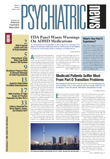Though a majority of adolescents in one Australian study would offer emotional support to a peer with mental illness, only about 1 in 4 would engage an adult to help when concerned about a friend's mental health.
In addition, 1 in 5 students would either take no action to help a friend with mental illness or would make harmful recommendations to the friend, according to a report published in the January Australian and New Zealand Journal of Psychiatry.
Researchers at the University of Melbourne's Orygen Research Centre surveyed 1,137 students aged 11 to 17 in schools throughout Southern Australia and the Australian Capital Territory. The schools and students were not randomly selected.
Students were presented with two written vignettes, each featuring an adolescent exhibiting symptoms of mental illness, and asked to address what actions they would take if the peer was a friend they wished to help.
In one of the vignettes, 16-year-old “Mark” displays symptoms of conduct disorder. He rarely comes to class and often frequents the mall, where he plays video games with friends. Mark has been in trouble for firesetting, vandalism, and theft. Though Mark's parents and teachers have tried to discipline him, “it does not work as he does not seem to care what anyone thinks,” according to the vignette.
In the other vignette, “Jenny” is a 16-year-old who has been feeling unusually sad for the past month. In addition, she has lost weight due to poor appetite, has trouble concentrating and making decisions, and has lost interest in playing guitar, which “she has always loved.”
Overall, in response to both vignettes, more than half of the respondents (53 percent) would offer emotional support to the person in the vignette or would seek further information about the situation from a trusted adult or through the Internet.
Just 23 percent indicated that they would enlist the help of a trusted adult, such as a school counselor.
About 20 percent of the adolescents surveyed would take no steps in helping the peer or expressed a desire to help but would have done so in an inappropriate way. For instance, according to the report, “a number of respondents wrote that they would purchase marijuana or alcohol for the distressed friend.” The authors surmised that “in some cases, this was probably a joke, but in other cases it was likely that the respondent considered the use of recreational drugs to be an effective coping mechanism in times of stress.”
Others encompassed in the 20 percent indicated that they would take violent action against the person in the vignette. Threats of violence may have been attempts at “misguided humor” on the part of some respondents, according to the authors, but for others, “the use of violence when trying to intervene with someone who is known for violence might seem appropriate.”
Other inappropriate responses included threats to “withhold friendship” if the person's behavior did not change.
Another 3.5 percent of respondents listed steps that researchers characterized as “positive social support” but also listed an inappropriate step that didn't involve drugs, alcohol, or violence.
When researchers analyzed the responses by gender, they found that the girls were more likely than the boys to seek an adult's help when concerned about a friend's mental health.
According to lead author Claire Kelley, Ph.D., this may be because“ girls more than boys recognize the seriousness of emotional problems” and the potential to develop into mental illness later in life. In contrast, “boys may find it easier to slowly extricate themselves from a friendship that is becoming complicated by emotional problems,” she told Psychiatric News.
Kelley is the Hugh Lydiard Research Fellow at the Orygen Research Centre.
One other noteworthy finding was that the girls responding to the depression vignette were more likely to offer positive social support (67.8 percent compared with 51.8 percent for conduct disorder), while those responding to the conduct-disorder vignette were more likely to enlist an adult's help (35 percent compared with 21 percent for the depression vignette).
Kelley speculated that “an overt behavioral program is more likely to be frightening to girls, especially if there have been previous episodes of violence by the person,” which prompts them to either steer clear” of that person or to “ensure safety by involving adults from the outset.”
Stigmatizing attitudes that are prevalent within society or a lack of knowledge about mental illness may play some role in the inappropriate modes of “help” suggested by some of the youngsters. “Many people do not understand that mental illnesses can be effectively treated or that people with mental disorders are not `crazy' or dangerous,” she said.
Mental health education in schools should “include skills for offering help and encouraging peers to seek help,” the authors concluded.
An abstract of “Adolescents' Responses to Peers With Depression or Conduct Disorder” is posted at<www.blackwellsynergy.com/action/showMultipleAbstracts>.▪
